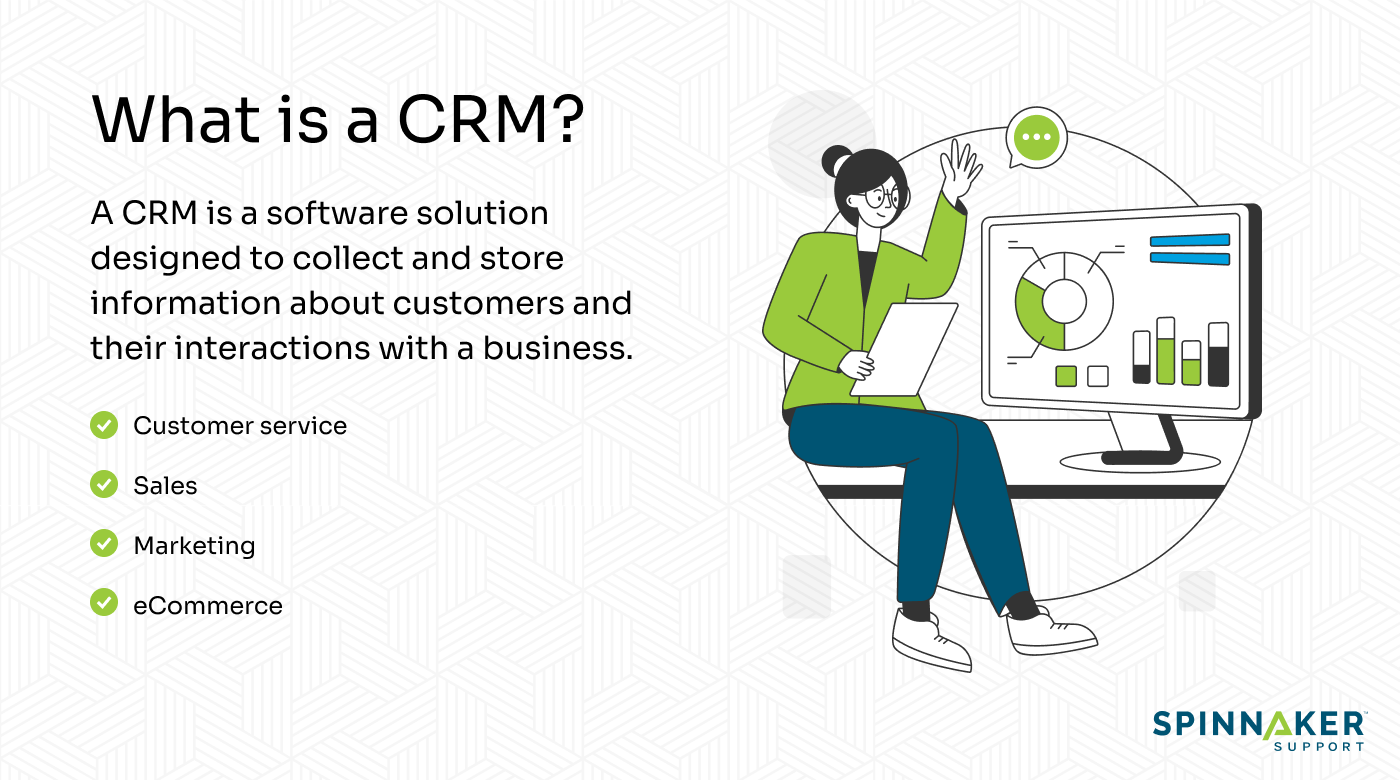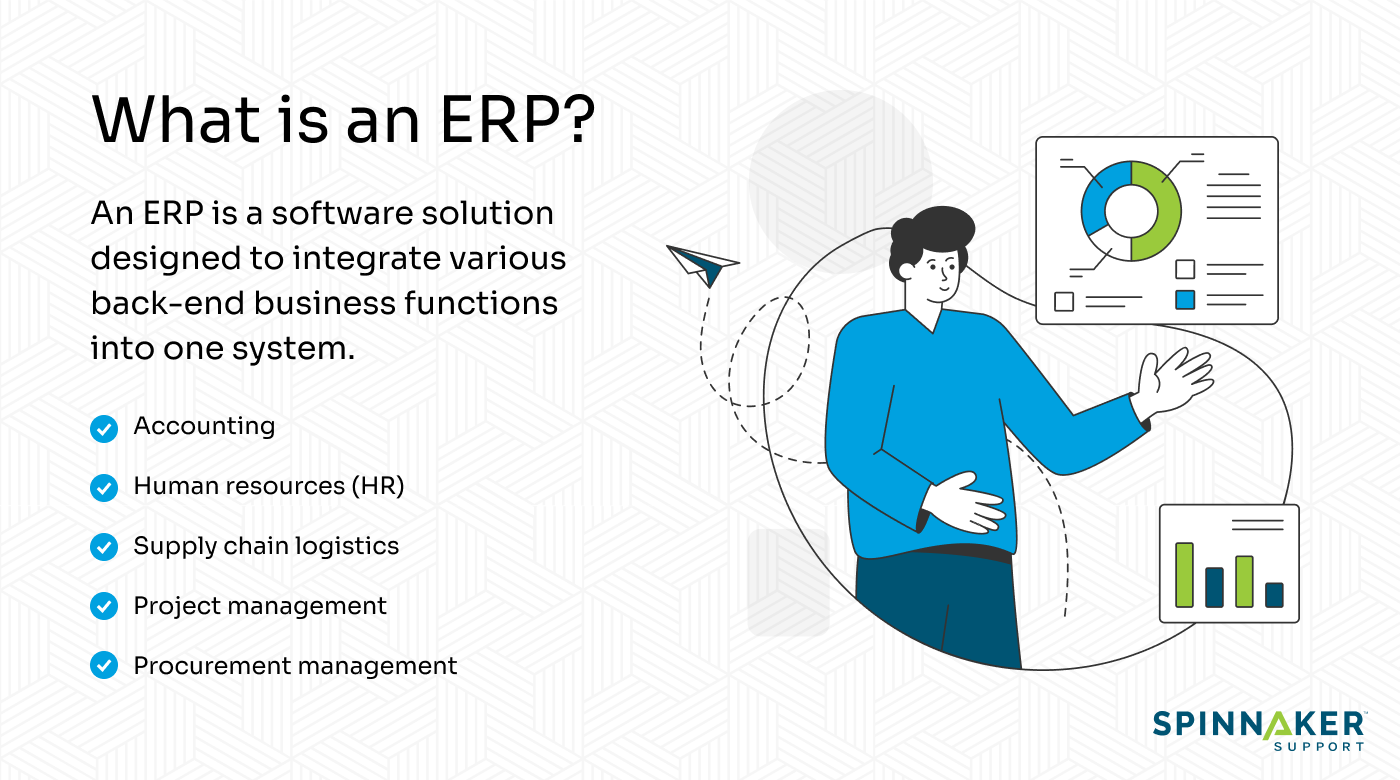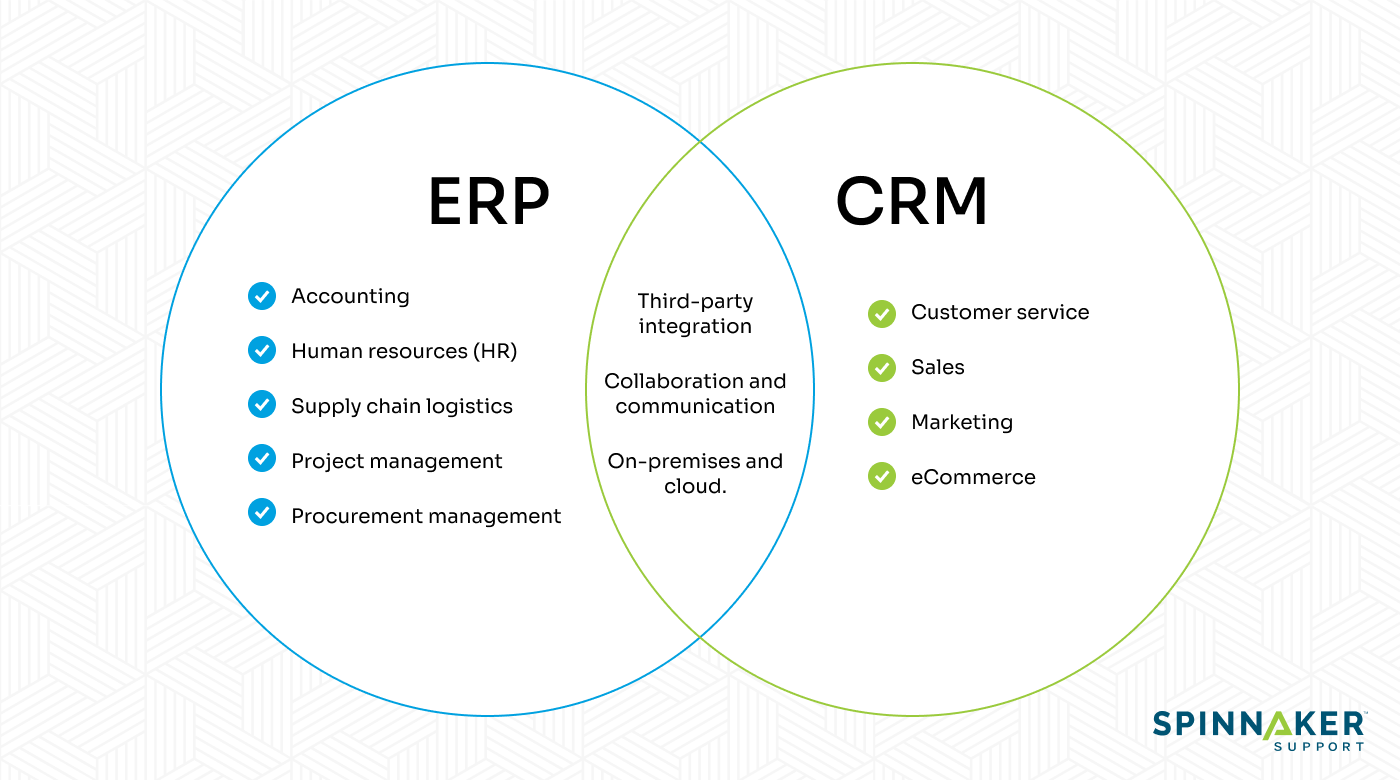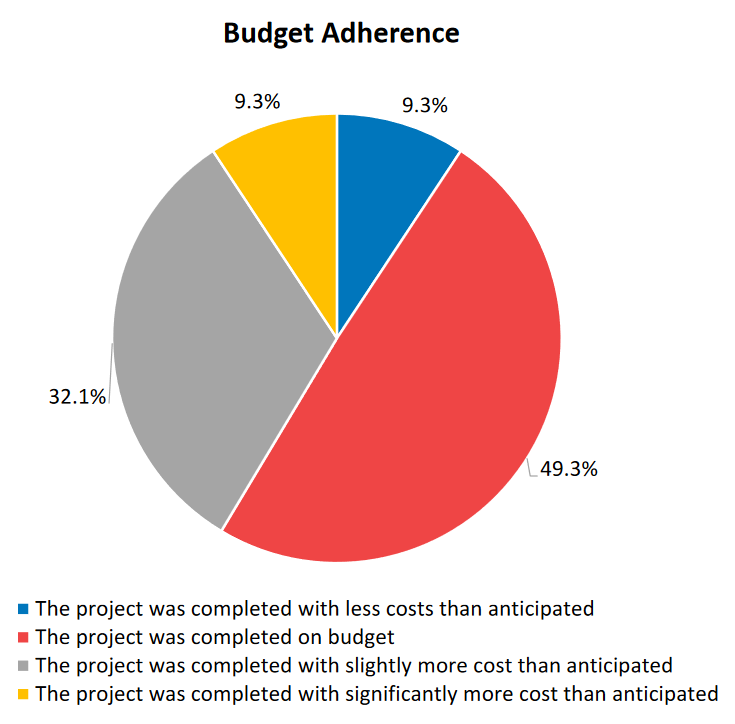Enterprise resource planning (ERP) and customer relationship management (CRM) are two systems that companies use to streamline their financial management and customer service activities.
While most companies eventually adopt both systems to support their growing needs, some may choose one over the other — especially companies with small customer bases and simple financial obligations.
In this article, we discuss the differences between ERP vs CRM and how to choose the right enterprise systems for your business.
What is a CRM?
A CRM is an enterprise software solution that collects and stores customer data.
CRM software gathers data related to every interaction a customer has with a business, including their purchase history, communications with customer service representatives, and service requests.

Modern CRM software automates several aspects of the customer experience. Examples include:
- Automatically deploying scheduled email marketing campaigns and social media posts
- Answering customer inquiries with context-appropriate chatbot responses
- Recommending products to customers based on their recent purchase history.
Aside from saving time on repetitive tasks, automation personalizes the customer experience at every possible touch point.
CRM key features
CRM software was originally developed to assist sales departments, combining database marketing with contact management to sort customer demand based on their individual needs. Since then, CRM software has expanded to include tools to assist with customer interactions, marketing, and e-commerce management.
Common CRM software features include:
- Lead generation
- Customer interaction tracking
- Live chat, call, email, and social media integrations
- Comprehensive insights and reports
- Performance monitoring
Benefits of CRM software
Improving the customer experience is the fastest-growing priority for customer care leaders. This goal experienced a 19% point increase in priority between 2019 and 2022.
CRM software can help make customer care a priority for your business by:
- Improving customer service
- Increasing productivity
- Increasing customer acquisition and retention
- Uncovering insights to make informed decisions
What is an ERP?
An ERP is an enterprise software solution that collects data from various business departments, such as accounting and human resources (HR) and more, and stores that data in a centralized database.

This central database functions as a single source of truth, allowing business departments to share data and insights, streamline workflows, and make informed data-driven decisions.
ERP software also automates previously manual tasks such as updating inventory records, processing invoices, and pushing software updates. This frees up time for employees to focus on more complex, labor-intensive tasks that still require human intervention.
ERP software captures data points across various departments, such as accounting and human resources (HR) and more.
ERP key features
Initially developed in the 1960s to assist with inventory management and production, ERP software has grown in complexity to support other back-end functions. Common ERP components include:
- Accounting: Invoicing, forecasting and budgeting, profit and loss statements, and tax reporting.
- Human resources (HR): Payroll, employee benefits, recruiting and onboarding, employee scheduling, performance management, and learning and development.
- Supply chain logistics: Asset management, logistics and transportation, warehouse management, purchase order management, and supplier management.
- Project management: Task management, time and budget tracking, resource management, and project dashboards.
- Procurement management: Sourcing, contract management, purchase order processing, and vendor payments.
Some ERP software is equipped with CRM capabilities to assist with customer service, marketing, and sales performance monitoring. However, it is uncommon for CRM software to have ERP capabilities.
Benefits of ERP software
Oracle and SAP are the second and third most popular ERP software vendors, while Microsoft takes the top spot. These vendors are a popular choice for businesses wanting to:
- Centralize their business data and essential functions
- Automate their business processes
- Improve their cross-department collaboration
- Improve their risk management and remediation (or mitigation) strategies
Spinnaker Support also provides third-party support for ERP products offered by SAP and Oracle. Our roadmap planning and technology advisory services can help you maximize the value and efficiency of your ERP systems.
Read more: How to Choose Between Different Types of ERM Systems
ERP vs CRM: How do they differ from one another?
While most businesses eventually adopt both ERP and CRM systems, smaller businesses may only need one or the other. Therefore, understanding the differences between the two can be helpful.

Let’s take a closer look.
Differences in features and use cases
An ERP system is primarily focused on streamlining back-end activities, which are the parts of the business that customers usually don’t interact with. Examples of back-end activities include onboarding new employees and procuring supplies from vendors.
On the other hand, a CRM system is primarily focused on streamlining front-end activities, which are the parts of the business that customers interact with. Examples of front-end activities include creating and distributing online marketing campaigns and attracting and nurturing potential leads.
There is also a difference in the type of data that ERP and CRM systems handle. For example, most CRM systems don’t handle transactional data — data related to sales orders, shipments, credit card payments, and more. Why? Because it makes more sense for the accounting team, who are using an ERP system, to handle this data.
That said, this transactional data doesn’t have to remain siloed in the ERP system. For example, let’s say the marketing department wants to gather data about a customer’s purchase history. To do this, they may cross-reference the transactional data stored in the ERP system, and then use that data to recommend similar products to that customer.
Industry use cases
Different industries embrace CRM and ERP capabilities in different ways to achieve specific outcomes. Seeing as the ERP system was invented to assist with inventory control, it makes sense for it to be used in warehouse settings.
Here are a few more industry use cases.
Manufacturing
CRM is used to manage relationships with customers, as well as distributors and retailers. Businesses can harness ERP capabilities to integrate general business processes (e.g. finance) with manufacturing processes (e.g. production).
Sales and marketing
CRM is used to attract and guide potential customers through sales funnels, retain existing customers, distribute email and social media campaigns, and suggest products based on purchase history.
Project management
ERP is used to manage the entire project management life cycle. Planning and scheduling time, budget, labor, and resources; collaborating with internal and external stakeholders; budgeting and forecasting spending; and performing risk management.
Third-party support from Spinnaker Support
Oracle Siebel, offered by Spinnaker Support, has project management capabilities to help companies stay in control of their work.
Spinnaker Support provides services for legacy and current Oracle Siebel CRM releases from 5.x to IP17. We also support clients in industries ranging from aerospace and communications to manufacturing and defense.
Read more: Best Practices for ERP Migration
Common challenges of ERPs and CRMs
As industries become more competitive and customer demand grows, incorporating an ERP and CRM system into your business becomes more complicated.
Here are the challenges to be aware of so you can anticipate and mitigate risk.
Deployment issues
Budgeting
Cost is a major factor when deploying a new ERP or CRM system. Unfortunately, 32.1% of enterprise software projects slightly exceed their anticipated budget, complicating digital transformation efforts.

To mitigate the risk of an ERP implementation failure, weigh up the cost benefits of a cloud migration strategy with an on-premises deployment.
Do you already run a few Oracle or SAP solutions on-premises? If so, your vendor may be forcing a cloud migration. They may even be ending mainstream support of your legacy software, as is the case with SAP.
Instead of migrating to the cloud on your vendor’s terms, you could switch to a third-party support provider like Spinnaker Support. Not only can we support your legacy Oracle and SAP products, but you could also save up to 60% on your annual support fees.
Data quality
Migrating low-quality data to a new environment is bad news. Inaccurate or disorganized data may be incompatible with your new platform. Worse still, it may create congestion, slowing down response times.
To avoid data quality issues, before migrating, be sure to remove filler data and modify essential data to ensure it is fit for purpose in the new environment.
Maintenance issues
To remain stable and efficient, ERP and CRM systems require ongoing maintenance. Failure to do so could lead to poor performance, service disruptions, and a worse user experience — both for employees and customers.
A poorly maintained ERP or CRM system may even be non-compliant with global, regional, and industry standards.
Integration issues
CRM and ERP integration is vital to streamlining the flow of data. For this reason, most vendors offer CRM and ERP integration out of the box. However, if you require a custom solution, then the path to integration may be less straightforward.
To avoid integration issues, review your existing software versions — or have a third-party support provider do it for you.
At Spinnaker Support, we can review your existing infrastructure and advise you on the best path ahead. In some cases, it may be more advisable to remain on-premises than deal with potential integration issues in the cloud.
Security threats
Research from the World Economic Forum shows that cyber inequality is rising. With an increase in digital devices and online presence, cyber risks are rising exponentially in the form of:
- Phishing
- Malware
- Denial-of-Service (DoS) attacks
- Code injection attacks
- Internet-of-Things (IoT) attacks
To reduce cyber risks, ERP and CRM systems need to be configured properly.
Update your software often. Perform system hardening (e.g. change default passwords, enable 2FA, install antivirus software, and enable automatic threat detection). And, configure your access controls to limit who can access what data.
Also, consider implementing cyber security training into your cyber remediation strategy.
How can Spinnaker Support help you get the most out of your ERP and CRM?
Below are a few ways that Spinnaker Support can help maximize the value of your ERP and CRM systems.

Comprehensive version support
Losing mainstream vendor support? Worried about the cost of a forced cloud migration? Switch to Spinnaker Support. We can support your existing Oracle Siebel and SAP versions for the entire duration of your service agreement.
In-depth security and interoperability coverage
At Spinnaker Support, we take a holistic approach to vulnerability management. We maintain and improve your IT security posture through continual investigation, advisement, and hardening of your CRM and ERP systems.
This includes a combination of:
- Risk mitigation
- Proactive security
- Regulatory compliance
You also benefit from a single vendor support solution. No need to juggle multiple vendors to support your Oracle, SAP, Salesforce, and JD Edwards configurations. You get it all under one support plan.
Customization support
Spinnaker Support can support and remedy poorly executed standard code, custom code, and interoperability issues. This applies to custom applications, tools, and databases. And we can develop fixes for poor software code, and advise you on what needs to be changed to support the customization.
Highly personalized service model
Our third-party support is personalized to suit your unique requirements. By partnering with Spinnaker Support, you benefit from:
- ERP global tax and regulation compliance updates in line with your geographic and application needs
- Third-party support for relevant Oracle, SAP, Salesforce, and JD Edwards applications
- Technical advisory services to handle new or complex issues related to your IT ecosystem
- Archiving services to help retain your specific software, data, and resources
ERP and CRM support solved
Support your CRM and ERP integrations with a personalized third-party service experience. By escaping direct vendor restrictions, you could save 60% on your annual support costs while enjoying the benefits of a more reliable and secure IT ecosystem.
Contact us today, and find out how we can help you maximize the value of your ERP and CRM systems.


